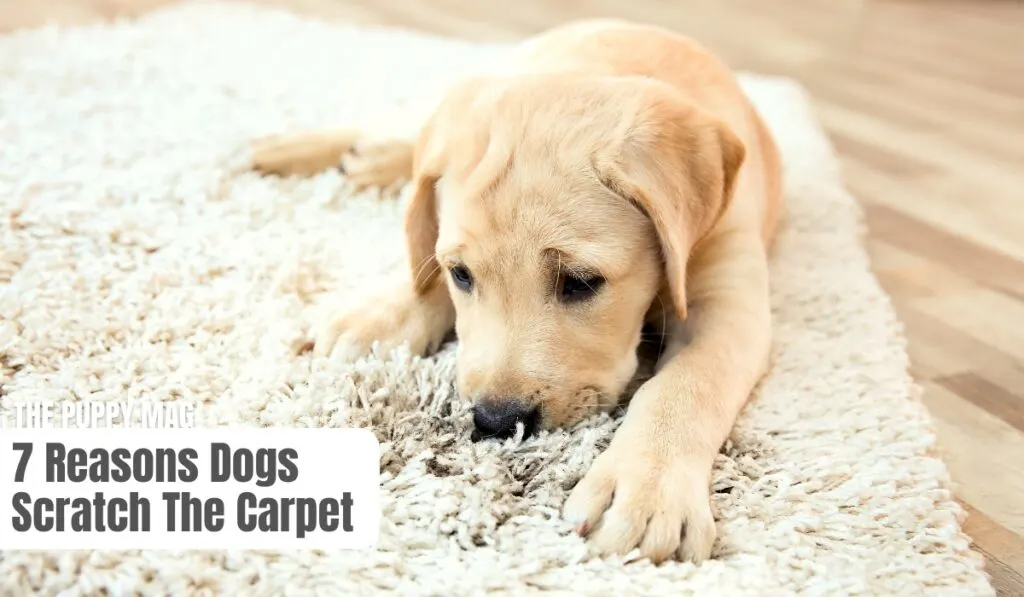If your dog is suddenly scratching the carpet it can leave you scratching your head!
I know how you feel, I’ve dealt with this before with my dogs!
This article explains why this behavior happens, what it could suggest (the good and the bad), and of course, how to stop your dog from continuing with this behavior.

Dogs scratch carpets when bored, frustrated, stressed, anxious, marking their territory, seeking attention, smelling or hearing something interesting, or due to an OCD habit.
7 Reasons Why Dogs Scratch The Carpet
Let’s run through the main reasons why most dogs suddenly start scratching the carpet to no end!
1. Boredom & frustration
When dogs get bored and subsequently frustrated, a lot of unwanted behavior can ensue…
Dogs need to release their energy, so if we don’t provide appropriate outlets and sufficient stimulation, they will find their own ways to do this. And that’s not good news for us!
Typical behaviors that boredom and frustration cause:
- Carpet scratching
- Wall and door scratching
- General destructive behavior
- Excessive chewing
- Excessive barking or whining
- Disobedience
- Harder to train
- Reduced attention and recall
So what causes boredom? The simple answer is being understimulated. Both physically and/or mentally.
It could be that your dog isn’t sufficiently exercised or mentally stimulated: a lack of mental stimulation is more likely. In most cases, your pup’s daily routine holds the answers…
It could be due to your busy work schedule that means leaving your pooch home alone for several hours, or simply that your dog’s exercise routine is lacking anyway.
Proper stimulation comes in the form of exercise, training, socializing with other dogs, playing nose work games, puzzle toys, and more…
All stimulation is good stimulation, and dogs must receive enough of it.
2. Stress & anxiety
Unfortunately, stress and anxiety affect our canine companions just as it affects us. When dogs are stressed and anxious they often resort to pacifying behaviors like scratching, digging, and chewing to seek comfort. Some experts consider these to be “canine calming signals“.
And this can be just the tip of the iceberg if the stress and anxiety progress. Depending on the cause and stage of it, your dog’s temperament may change and even their health.
What can cause dogs stress and anxiety:
- Under stimulation
- Being left alone for too long (and often)
- Not receiving enough attention
- Moving homes
- Getting new neighbors
- Unusual changes in their environment
- The loss of another pet or someone in the home
- Louds noises such as fireworks
- Changes inside the home (people or furniture)
Needless to say, a lot of things can unsettle our dogs!
It’s worth considering any big changes that have recently happened, as well as being honest about your dog’s routine.
First, make sure they are sufficiently stimulated and all their needs are taken care of.
Then consider external factors like their environment and home-life.
Popular: Why Does My Dog Shake Head After Barking? (weird behavior explained)

Psst. A quick update on puppy training! Brain Training For Dogs is so far one of the best training regimes we’ve seen for puppies. It works with any breed and improves obedience and behavior quicker than we thought possible. It’s a must for any new puppy owner. Okay, back to the article!
3. Marking their territory
Your dog may be scratching the carpet for the purpose of marking their territory…
It’s not just peeing that does this! They scratch and chew too.
This usually happens in households with multiple pets or dogs, where one dog feels the need to prove themselves or their position over the other.
Admittedly, it’s hard to diagnose whether this is the actual cause…
However, If you have multiple pets/dogs that are frequently trying to dominate one another, then this does highlight hierarchy issues, and so carpet scratching may become relevant.
Interesting read: Why do dogs like to lay on us? (explained)
4. Seeking attention
Believe it or not, carpet scratching can be a dog’s way of seeking your attention.
The thing with dogs is that when they feel understimulated or neglected, any attention from you is good attention, no matter how they earn it.
If your dog’s actions get him a response from you and your attention, he’ll know to do it again whenever he wants your attention.
In most cases, if your dog feels the need to try and gain your attention, then it’s likely you aren’t giving them enough in the first place (regardless of what we think).
This is particularly true for dogs that are left home for long periods of time.
We all have busy lives with crammed routines, but that shouldn’t mean our dogs get put on the back burner… Consider your dog’s routine and how much quality time you dedicate to them. Everything from exercise, training, playing, and general interaction counts as quality time.
5. Smelling or hearing something (food or other animals)
When it comes to senses, a dog’s sense of smell is by far their strongest (and it’s pretty impressive too!)
A dog can smell anywhere between 10,000 to 100,000 times better than we can, meaning they are constantly smelling new things in their environment that we have no idea about.
Your dog can smell old food, drink spills, and other things that may have been on your carpet yesterday, or months ago. If it’s something particularly interesting, it could lead them to lick, chew, and scratch at it.
In addition to hoovering up crumbs, your dog may be able to smell AND hear rodents underneath the floorboards… It’s very normal for houses to have mice (and sometimes rats) underneath. Some breeds like Yorkies, for example, were bred to sniff out and hunt small critters like these…
Trending article: Can puppies have marrow bones? (what owners must know)
6. Obsessive compulsive habit disorder (OCD)
As crazy as it sounds, dogs can develop obsessive-compulsive disorder just as we can.
In some instances, carpet scratching may have started out from being understimulated or stressed, but if your dog continues to do it over time, it could turn into a habit.
This highlights why it’s important to stop unwanted repetitive behavior as soon as you are aware of it.
If we let out dogs do something for long enough, OCD can kick in. And it can be for anything… Not just carpet scratching.
It’s worth considering how long your dog has been scratching at the carpet, if it’s something that has only happened very recently then it’s unlikely to be OCD. Just keep in mind that habits can form quickly.
7. Health issues
As weird as it may sound, some health issues could result in your dog scratching the carpet.
Dogs have ways of dealing with illnesses that are different from us (mainly due to the fact they don’t necessarily understand what is happening to them).
Scratching, just like licking and chewing, is a very pacifying behavior.
Just as dogs may scratch when they are stressed or anxious, they may also repetitively scratch as a way to cope with pain or an uncomfortable feeling they have.
Certain health issues can cause dogs to engage in pacifying behaviors:
- Allergies
- Skin problems
- Hormonal imbalances
- Arthritis
- Hip dysplasia
While these health issues often come with other more obvious symptoms, scratching, licking, and chewing could be an indirect way of your dog coping with the pain from these issues.
This is why it’s very important to schedule an appointment with your vet if your dog is also refusing food, has diarrhea, vomiting, is dizzy, fatigued, or doesn’t seem their usual self.
How To Stop Your Dog From Scratching The Carpet
There are various ways to overcome this issue, most of which rely on getting to the cause of the problem. It’s important to consider the factors mentioned above and compare your dog’s routine and situation.
1. Providing stimulation & attention
Boredom, frustration, being understimulated and feeling neglected account for A LOT of unwanted behavior like carpet scratching…
If you think this could be the cause then try the following:
- Provide sufficient exercise for the breed you have (don’t skimp on exercise!)
- Split exercise up into two sessions (morning and evening)
- Provide basic command training every day (even if they already know it!)
- Provide extra mental stimulation by encouraging more socialization & puzzle toys
- Spend more time in the yard with your dog
- Durable chew toys
- Consider a dog sitter if you work long hours leaving the house empty
These are good habits to put in motion even if your doggo isn’t scratching the carpet! Extra stimulation will always be a good thing.
2. Redirection training
Quickly correcting unwanted behavior is another important step in this process.
But it must be done right. Remember earlier we said any attention is good attention, so we have to divert and reward correctly.
When your dog scratches the carpet, give a quick firm “No” and provide another activity or item for your dog to focus on. You could either run through a quick training exercise or wave their favorite toy in front of them.
The important thing here is to 1) distract your dog away from the carpet location 2) only praise and reward after a solid 10 seconds of your dog focusing on the correct item.
By praising at the right moment, you will teach your dog that they get rewarded for chewing their toy or following your commands, not scratching the carpet.
If you reward too quickly after the scratching, your dog may associate the two together. And that would not be good!
3. Avoid punishing
All your dog needs to learn is a firm “No!” and to be shown what they are allowed to bite/scratch/chew.
Dogs do not always clearly understand what they are being punished for (even if they have a good guilty face).
Punishing more excessively than a simple “No”, could be invoking more fear and anxiety into your dog than you realize… Which will only make the scratching worse.
A fearful dog is one that’s highly stressed and anxious and won’t know what on earth they should be doing. It’s a vicious cycle, so punishing (more than a simple no) just isn’t a good idea.
Popular articles:
- Why do dogs get hiccups? (solved!)
- Why is my puppy chewing his bed (and how to stop it)
- Why is my puppy always whining? (full guide)
Thanks for reading! Back to more Health or Behavior articles
Resources:
